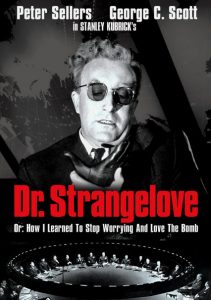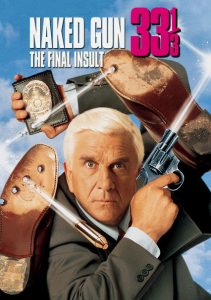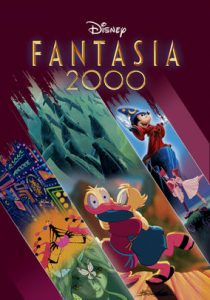Dr. Strangelove-1964
Director Stanley Kubrick
Starring Peter Sellers, George C. Scott
Top 250 Films #242
Scott’s Review #958
Reviewed November 13, 2019
Grade: A
Dr. Strangelove, or How I Learned to Stop Worrying and Love the Bomb, more commonly known simply as Dr. Strangelove, is a 1964 political satire black comedy film that satirizes the Cold War and fears of a nuclear conflict between the Soviet Union and the United States.
The film, timely in the 1960s, is as relevant decades later amid the chaos during the 2016 United States Presidential election and the following tumultuous years.
The film is powerful, brave, and essential.
The story centers around an unhinged United States Air Force general (Sterling Hayden) who orders a first-strike nuclear attack on the Soviet Union.
The plot follows the President of the United States (Peter Sellers), the Joint Chiefs of Staff, and a Royal Air Force (RAF) officer as they try to recall the bombers to prevent a nuclear apocalypse.
The film also follows the crew of one B-52 bomber as they try to deliver their payload.
The Cuban Missile Crisis was fresh in viewers’ minds when this film was released, and President John F. Kennedy was recently assassinated. The United States and the Soviet Union were hardly best buddies.
The film was a robust offering because its political satire was fresh. The ironic controversy between the two leaders, nearly sixty years after the film was released, is unintentionally clever.
The acting is excellent. Peter Sellers plays three prominent roles. Each is quite different from the others. Group Captain Lionel Mandrake, a British RAF exchange officer, President Merkin Muffley (what a name!), the President of the United States, and Dr. Strangelove, the wheelchair-using nuclear war expert and former Nazi.
Each glistens with goodness as the actor chomps at the bit, making them precise and unique, careful never to stray too far overboard into ridiculousness.
Director Stanley Kubrick wisely chooses black-and-white cinematography with stellar results and prominent filmmaking techniques.
As creative and progressive as many 1960s films started to become as the decade blossomed, it feels like it could have been made in the 1940s.
Kubrick, well known for masterpieces such as The Shining (1980) and 2001: A Space Odyssey (1968), delivers perhaps the oddest film in his catalog with Dr. Strangelove.
The story does not feel dated, and the dialogue remains crisp and razor-sharp in its delivery and meaning. With fast dialogue delivery and a monotone vocal style, the film is entertaining and humorous. It does not take itself too seriously yet brings a poignant and vital idea to life.
The film keeps gnawing at the viewers that as far-fetched as events seem, the possibility they could become real is more than a bit scary.
Who can forget the final sequence of the looming nightmare of the mushroom clouds, set to Vera Lynn’s hopeful We’ll Meet Again?
Since the film has a 1940s cinema style, the rude awakening that the 1960s produced in nuclear weapons and insecurity hits home in this sequence.
Dr. Strangelove (1964) is pure satire but frightening in its realism and uncertainty about how one crazy leader could lead an entire nation to detrimental results.
The film highly influenced later satires and unique filmmaking styles—Wes Anderson’s creations immediately spring to mind.
One can wonder about the different possibilities offered—in a way, the situation’s absurdity and the unthinkable way it could quickly become a reality.
Oscar Nominations: Best Picture, Best Director-Stanley Kubrick, Best Actor-Peter Sellers, Best Screenplay Based on Material from Another Medium



